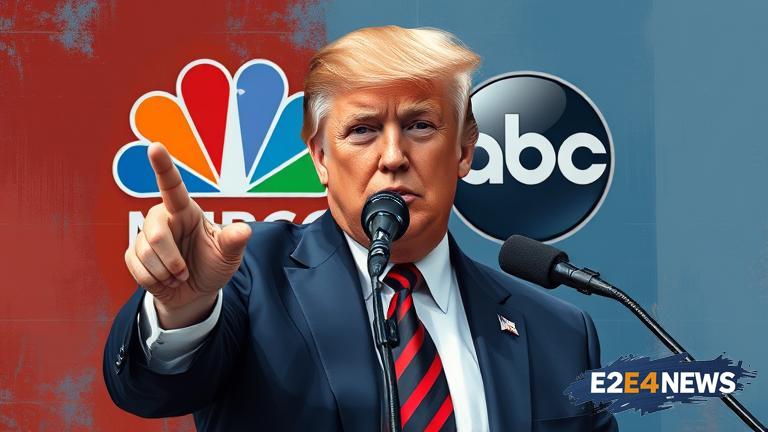President Trump’s recent tweets have sparked a heated debate about the role of the media in a democratic society and the limits of presidential power. The President’s threats to revoke the licenses of NBC and ABC have been met with widespread criticism and concern from media outlets, lawmakers, and civil liberties groups. The controversy began when NBC reported that Trump had suggested increasing the US nuclear arsenal, which the President denied. Trump then took to Twitter to express his displeasure with the report, stating that NBC’s license should be revoked. The President’s comments were widely condemned, with many arguing that they represented a threat to the First Amendment and the freedom of the press. The FCC, which is responsible for issuing broadcast licenses, has stated that it does not have the authority to revoke licenses based on the content of a station’s programming. The FCC’s chairman, Ajit Pai, has also stated that the agency will not revoke licenses based on political pressure. Despite this, Trump’s comments have sparked concerns about the potential for political interference in the media. Many have pointed out that the President’s threats are not only unconstitutional but also impractical, as the FCC’s licensing process is designed to ensure that broadcast stations operate in the public interest. The controversy has also highlighted the importance of a free and independent press in a democratic society. The media plays a crucial role in holding those in power accountable and providing citizens with the information they need to make informed decisions. The President’s attacks on the media have been widely condemned, with many arguing that they represent a threat to the very foundations of democracy. The controversy has also sparked a debate about the role of social media in the dissemination of information and the potential for political manipulation. Some have argued that social media platforms have a responsibility to regulate the content that is posted on their sites, while others have argued that this would represent a form of censorship. The debate has highlighted the need for a nuanced understanding of the complex relationships between the media, the government, and the public. As the controversy continues to unfold, it is clear that the implications of Trump’s threats will be far-reaching and will have significant consequences for the media, the government, and the public. The President’s comments have sparked a national conversation about the importance of a free and independent press and the need to protect the First Amendment. The controversy has also highlighted the need for greater transparency and accountability in government, as well as the importance of a well-informed and engaged citizenry. In conclusion, Trump’s threats to revoke the licenses of NBC and ABC have sparked a heated debate about the role of the media in a democratic society and the limits of presidential power. The controversy has highlighted the importance of a free and independent press, the need to protect the First Amendment, and the importance of transparency and accountability in government. As the debate continues to unfold, it is clear that the implications of Trump’s threats will be far-reaching and will have significant consequences for the media, the government, and the public. The President’s comments have sparked a national conversation about the importance of a free and independent press and the need to protect the First Amendment. The controversy has also highlighted the need for greater transparency and accountability in government, as well as the importance of a well-informed and engaged citizenry. Furthermore, the debate has sparked a discussion about the potential consequences of a president attempting to revoke the licenses of major media outlets. Some have argued that such an action would be a clear violation of the First Amendment and would have significant implications for the freedom of the press. Others have argued that the President’s comments are simply a form of political rhetoric and do not represent a genuine threat to the media. Regardless of the motivations behind the President’s comments, it is clear that the controversy has sparked a national conversation about the importance of a free and independent press and the need to protect the First Amendment. The debate has also highlighted the need for greater transparency and accountability in government, as well as the importance of a well-informed and engaged citizenry. In addition, the controversy has sparked a discussion about the role of the FCC in regulating the media and the potential consequences of political interference in the agency’s decision-making process. Some have argued that the FCC should be more aggressive in regulating the media, while others have argued that the agency should maintain its independence and avoid political interference. The debate has highlighted the need for a nuanced understanding of the complex relationships between the media, the government, and the public. As the controversy continues to unfold, it is clear that the implications of Trump’s threats will be far-reaching and will have significant consequences for the media, the government, and the public.
